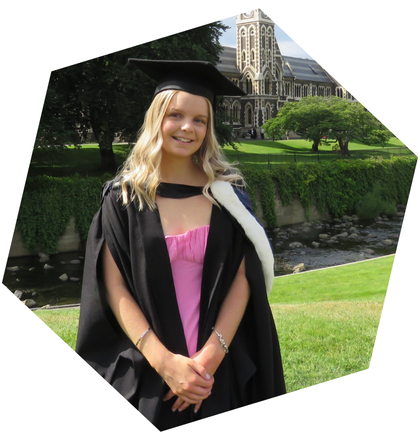Case Study
Summer Studentship 2024-2025: Delicia O'Brien
Delicia O'Brien's Summer Studentship allowed her to research 'Diabetes Education Resources for Young People Living with Type 2 Diabetes'. In this interview we hear what motivated her to explore this.
1. Can you tell us how you got involved with medical research?
This is my first experience in medical research. I was approached by one of my lecturers during the final year of my undergraduate degree in Human Nutrition, which led to my involvement. I hadn’t really considered research before, but when the opportunity came up, I was eager to get involved.
2. Could you provide a brief overview of the key aspects your study will explore?
My research explores the educational resources available to tamariki and rangatahi diagnosed with Type 2 diabetes and their whānau. As part of this study, I conducted a scoping review to assess what resources currently exist specifically for young people and identify any gaps in the literature.
From there, I was involved in designing and conducting a nationwide survey to explore:
- What diabetes educational resources are available for young people under 25 years with Type 2 diabetes, particularly for Māori and Pacific communities?
- What diabetes education resources are needed for young (<25 years) Māori and Pacific people diagnosed with Type 2 diabetes and their whānau?
The findings from this research will help guide the development of additional resources to complement existing support for tamariki, rangatahi, and their whānau living with Type 2 diabetes in Aotearoa New Zealand.
3. Can you tell us about your motivation and inspiration for your research?
My motivation for this research stems from my journey through my human nutrition degree and transition into my master of dietetics degree. Throughout my undergraduate degree, I developed a deep interest in diabetes and its impact on individuals and communities. As I begin my studies in dietetics, this interest is only growing stronger, especially as I’ve had this hands on experience in addressing complex health issues through this research project. It has been a great way to develop new skills and gain practical experience which is something that can’t be learned in a lecture theatre. More importantly, I saw it as a chance to contribute to something bigger than myself, with the potential to make a real difference in people’s lives.
4. Can you elaborate on how your research project will positively impact the lives of individuals in Aotearoa living with diabetes?
This research project will have a positive impact on individuals in Aotearoa living with diabetes by identifying gaps in existing resources and exploring ways to enhance the support systems available for tamariki, rangatahi, and their whānau newly diagnosed with Type 2 diabetes. While valuable resources and support already exist, this project will ensure that young people and their families have access to clear, culturally relevant, and effective education. This will empower them to manage their condition with confidence, ultimately improving long-term health outcomes. By focusing on equitable outcomes, the project aims to create resources where young people can see themselves, leading to more inclusive and supportive approaches for all.
5. What does it mean to you being selected as one of the five recipients of the Summer Studentships this year?
Being selected as one of the five recipients of the Summer Studentship is an incredible honor. It’s a privilege to contribute to meaningful research that has the potential to make a real difference in the lives of tamariki, rangatahi, and their whānau. This opportunity not only allows me to develop valuable research skills but also deepens my commitment to addressing health disparities and promoting better nutrition. As someone aspiring to become a dietitian, this experience is a crucial step in my journey, as it gives me the chance to gain hands-on experience and further my understanding of how research can impact health practices. I’m grateful for the chance to learn from experienced researchers and to be part of a project that can help shape future resources for communities in Aotearoa.
6. The Summer Studentships are made possible thanks to donations to the Diabetes Research Foundation. Please tell us how important these Summer Studentships are to others looking to conduct research?
The Summer Studentships are incredibly important, as they provide an opportunity to build unique skills and gain hands-on experience. Through my undergraduate degree, I have built a solid foundation of knowledge around diabetes, and this research experience has further expanded that knowledge. These studentships not only provide the opportunity to deepen one’s research skills but also offer a platform for networking with professionals and researchers in the field, which is crucial for building future career connections. The support from the Diabetes Research Foundation is key to helping students like me gain the experience needed to make meaningful contributions to the field of diabetes research and beyond. I look forward to exploring this area further after completing my master's degree and putting to use the knowledge and connections this summer studentship has provided.

